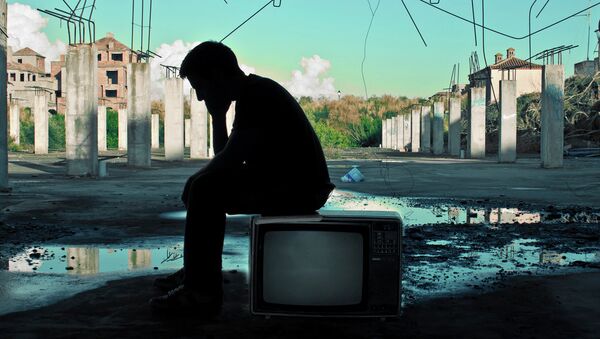Humans are not the crown jewel of evolution
To understand the specifics of human associations and their radical difference from a pack of animals, it should be understood that humans are not a product of the evolutionary process. No matter what we think about the evolutionary process. Whether we stick to the Darwinian approach with its random variability and selection of adaptive acquisitions or to the future ontogenetical theory, which will describe the evolutionary process as a deployment of one systemic entity. Or to any other theoretical construct.
I hold the view that humans appeared as a result of a totally different — not evolutionary — process. Evolution just formed a carrier material for them. And it ended after such a pre-human was created. We can assume that creating pre-humans was its ultimate target. That is why not a single theory of evolution, even the one that may have overcome all the absurdities of Darwinism, will be able to describe the appearance of humans.
From a pack to a community
Of course, humans did not evolve from apes. It is well known that humans as a species (I will call them pre-humans) appeared long before groups of humans started using tools, developed a language and never-before-seen effective forms of collective behavior. Evolution produced the biological basis of humans (but not humans per se) 400,000 or 2 million years before (research data varies) the "wise man" we know today appeared. During this time, this species lived like animals. The process that gave birth to humans involves a pack turning into a community. The biological material remained unchanged. The mystery of the origin of man is hidden in this transition. The "fire of the mind," to use a philosophical term, likely appeared during this transition. Piaget was exactly right when he said that people living in a community are becoming aware of their own behavior.
I'm not going to describe the possible models of how this may have occurred.
Most likely, this transition was the result of developing reflection mechanisms based on existing biological capabilities. Reflection in living beings is not a mirror that reflects everything that comes its way.
Reflection is a systemic element of behavior. An animal reflects from the outside world only things that it needs to adjust its behavior and remain functional. Reflection is a selective and focused process.
Perhaps the transition from a pre-human to human is due to the fact that a pre-human began to shift his attention from important features of the outside world to his own and collective behavior. For example, he started focusing on a sound that he made, or gestures, which he did in a certain situation, and some counterparts' reactions to these signals.
By the same token, for his fellow tribesmen, these sounds or gestures began to designate a situation that called for collective actions. As soon as pre-humans formed a link between the sounds or gestures that have so far been random behavioral reactions to a particular situation and effective collective behavior, they were able to make deliberate signals. Particular sounds and gestures then became a mandatory element of mobilizing a complex collective action. Pre-humans then proceeded to form a special attitude on differentiating these signals. Pre-humans began to intentionally use different signals to designate different situations or different signals to initiate a variety of collective actions. Such signals were no longer a reflex reaction. They lose causation triggered by various stimuli from the outside world. These signals have become signs. People used signs to report their situation, encourage collective action or draw attention to important details of a situation at hand.
Thus, due to a reflection aimed at the behavior itself (i.e., reflexion), a signal is converted into a sign, sets of signals into a language, prehumans into humans, a pack into a community. The behavior awareness seems to be inextricably linked with the birth of a language. I think both statements are true: the fact that behavior awareness occurs through language and language is born in the process of behavior awareness.
Importantly, the behavior of the community is no longer about implementing a specific genetic program. Genome no longer acts as the sole identifier of behavior. The community begins to establish new patterns of behavior. Furthermore, due to its linguistic richness, the community gets significantly broader opportunities for transmitting it to next generations. The primitive ritual is an action that is extremely rich in signs and crystallizes the collective experience. The behavior that is produced by a human community, and not by an evolutionary process, and is not reproduced genetically, but through the mechanisms of culture, already acquires a different nature and becomes an activity. Humans become humans only through their involvement in the life of a human association, not by themselves or due to their biological nature.
Humans without identity
The importance of behavior awareness is underestimated. The awareness of any behavioral program results in it losing its automaticity. This is true even of sensations and perceptions. The verbalization of sensations changes them.
"Pure" perception and perception in a linguistic field are different. Sensations and perceptions that are organized reflexively (using signs) secondarily become automated again, but this time they are significantly different.
Humans ceased to be a natural being in the true sense. They have become techno-natural beings, where "nature" occupies a subordinate position and is plastic and transformable. Not a single instinct, not a single physiological mechanism is no longer a "law" for them. The control over any biological process can be taken over by their mind. Humans can arbitrarily change their nature. The identity of any animal is in its specialized behavioral program package.
The animal's body is just a material expression of this program package. Humans, conversely, no longer have such an identity. They must find it in the course of their lives, find their place and determine the content and the form of their participation in social life.
Marx wrote about human alienation. He didn't, though, understand its original existential nature.
By the way, medicine missed this point. It treats humans as animals at best when it tries to restore the body's "self-regulation." However, more often it still treats them as a broken car when it tries to have it repaired surgically or provide chemical prostheses (drugs). Supposedly, human medicine should organize the awareness of processes, including physical ones, and use them to restore health. Especially unacceptable are the attempts to biologize humans in sociopolitical contexts. All those who talk about the need to improve human nature are lying, as humans have no nature. This argument can be used only to rationalize running concentration camps, implanting chips and making robots out of humans.
The situation of a human
Pre-humans belonged to nature and their existence was guaranteed by biospheric mechanisms and the fact that they, like all other living beings, acted in accordance with their behavior. From now on, their behavior and activities are not naturally consistent and harmonious with the processes of reproduction of the entities of a higher order.
The evolution of humans from pre-humans means that their existence has become a problem, their problem. The activity is not part of nature. Human activities may deviate significantly from the task of reproduction. Moreover, nature now becomes an element included in human activities, and its reproduction also becomes part of the humankind's responsibility. Consequently, we can now say that humans belong not to nature, but to an entity of a completely different order. Using a term coined by Vernadsky, we can refer to it as the noosphere. Critically important now is the extent to which humans are aware of this social and activity entity with all that is included in it by nature, technology, humans themselves, and how well they can handle all of this as they fine-tune normal operation, reproduction and development. Instincts are replaced with the understanding of what needs to be done to preserve the viability of the noosphere.
Now, humans themselves can and have to determine the way of their existence: what rules of common life, which motivations, and what modes of action they will practise. Lines of social evolution are, in fact, the practice of particular collective or individual life.
Every society is a solution to the problem of existence. Such a decision is always multi-layered: it includes people's motivations, daily rules and customs, the organization of the economy, institutions, laws and the administrative superstructure. However, it all has an underlying element: understanding someone's situation in life. Any, even the most seemingly traditional, way of life and a natural life motivation always have a source: someone has once understood a situation in a certain way and was able to introduce new approaches into the minds of other humans.
Abrahamic religions believe that man is a co-creator and a vicar of God on Earth. His survival depends entirely on his ability to maintain this position of knowledge and responsibility.
The degeneration
In his books, Alexander Zinoviev described in detail the "law of egotistical calculation." This is what he wrote about it: "Pursuant to this law, every normal and active member of society grabs as much of what life has to offer as he can based on his social position. He does so with impunity within the boundaries permitted by society, or at least with a high degree of impunity." Zinoviev was absolutely right in saying that selfishness determines a lot in the behavior and activities of the people in the social systems that he studied. Only he mistakenly believed in natural invincibility of this motivational complex and overestimated its power. Although he himself said that he dreamed of a new man who is not calculating, but rather soulful and full of life. He also wrote about the importance of the factor of understanding.
The viability of a system, its immunity against degeneration, directly depends on how each person understands the whole, and how determined he is to preserve the whole. Whether the connection with the whole in the past, the present and the future is obvious to everyone. Selfishness is not a natural law. Selfishness grows from the same root as conscience — reflexivity. Only in this case, the reflection is aimed not at defining oneself in the reproduction of the whole, but at its selfish use.
The degenerates are those who refuse to understand the whole and to determine their level of participation in its reproduction; those who, in fact, refuse to follow the human way of being or to look for their niche (their unique identity).
The sacred books also clearly state this: each will be responsible personally for all that he or she did or didn't do.
We can also talk about a system-wide degeneration phenomenon. First of all, this occurs when the social system begins to be controlled not in the interests of its reproduction, but in the interests of an individual organ, social group or a particular group of people, which leads to a decrease in the overall viability of the system.
The worst thing occurs when large masses of people start losing connection with the whole and turn into accomplished egoists. Especially when everyone wants freedom and believes that the entire world exists for them to be able to self-realize and accomplish their dreams. More on that next time. To be continued.
Iskander Valitov, methodologist, Rossiya Segodnya's Zinoviev Club member


